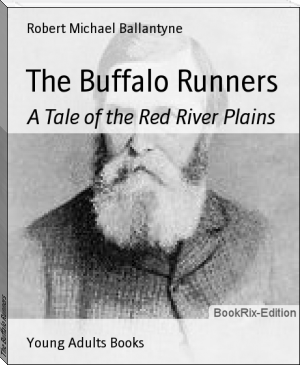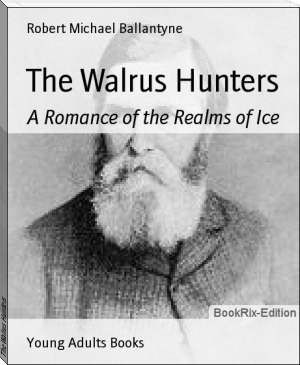The Buffalo Runners by Robert Michael Ballantyne (different e readers .TXT) 📕

Read free book «The Buffalo Runners by Robert Michael Ballantyne (different e readers .TXT) 📕» - read online or download for free at americanlibrarybooks.com
- Author: Robert Michael Ballantyne
Read book online «The Buffalo Runners by Robert Michael Ballantyne (different e readers .TXT) 📕». Author - Robert Michael Ballantyne
"Kateegoose is not a medicine-man. He cannot be in two places at once. He knows nothing."
For a sly man La Certe was wonderfully credulous. He believed the Indian, and, returning to his tent, lay down again to finish the interrupted pipe.
"Kateegoose was trying his gun to see if it was loaded," he said to his better half.
"That's a lie," returned Slowfoot, with that straightforward simplicity of diction for which she was famous.
"Indeed! What, then, was he doing, my Slowfoot?"
"He was _loading_ his gun--not trying it."
"Are you sure?"
"Am I sure that our little child loves tobacco?"
"Well, I suppose you are. At any rate, the child often asks you for a pipe, and gets it too. Hm! if Kateegoose fired that shot he must be a bad man. But our chief is sure to find it out--and--it is no business of mine. Fetch me the tobacco, Slowfoot."
That same morning, Archie Sinclair was seated beside his brother, Little Bill, in the tent that was shared by Fred Jenkins and several young half-breeds. He was alone with his brother, Jenkins having gone out with the blunderbuss to assist, if need be, in the defence of the camp. He was manufacturing a small bow for his brother to amuse himself with while he should be away "seein' the fun," as he said, with the hunters. The instant the sailor left, however, he looked at Billie mysteriously and said, in a low voice--
"Little Bill, although you're not good for much with your poor little body, you've got a splendid headpiece, and are amazing at giving advice. I want advice just now very bad. You've heard what they've all been saying about this shot that was fired at Okematan, and some o' the men say they think it must have been Kateegoose that did it. Now, Billie, I am _sure_ that it was Kateegoose that did it."
"Oh!" exclaimed Little Bill, making his eyes and mouth into three round O's. "How d'ye know that? Did you see him do it?"
"No--it's that that bothers me. If I had seen him do it I would have gone straight and told Dechamp, but I didn't quite see him, you see. I was in Lamartine's cart at the time, rummagin' about for a piece o' wood to make this very bow, an' the moment I heard the shot I peeped out, an' saw--nothing!"
"That wasn't much," remarked Little Bill, innocently.
"Ay, but I soon saw something," continued Archie, with increasing solemnity; "I saw Kateegoose coming slinking round among the carts, as if he wanted not to be seen. I saw him only for a moment--gliding past like a ghost."
"It's a serious thing," said Little Bill, musing gravely, "to charge a man with tryin' to kill another man, if that's all you've got to tell, for you know it's a way the Red-skins have of always glidin' about as if they was for ever after mischief."
"But that's not all, Little Bill," returned his brother, "for I'm almost certain that I saw a little smoke comin' out o' the muzzle of his gun as he passed--though I couldn't exactly swear to it."
Archie had overrated his brother's powers in the way of advice, for, although they talked the matter over for some time, they failed to arrive at any satisfactory conclusion.
Meanwhile Okematan, having entered the camp, was met by Dechamp, and led by him to a retired part.
"You have an enemy here, Okematan," he said, inquiringly.
"It would seem so," returned the Indian gravely. "Friends do not shoot each other's horses; and if the poor horse had not tossed his head when the shot was fired, his rider would have bit the dust."
"I fear it looks something like that," said Dechamp; "but I hope Okematan believes that _I_ know nothing of the matter--nor can I tell who the cowardly villain is that did it."
"Okematan knows that," answered the Indian, sternly. "No half-breed fired the shot."
"There is no Indian in the camp but Kateegoose," rejoined the other, quickly; "surely you don't think that a man of your own tribe would try to kill you?"
"I know not. Kateegoose hates me. No other man in the camp hates me."
"It is strange--unaccountable," returned Dechamp. "If the Indian did it, he shall forfeit his horse and leave the camp. But tell me,"--here the half-breed commandant turned a searching gaze on his companion, "why did Okematan leave us, and spend all night alone on the prairie? Did he spend the night in conversation with the buffalo--or in the company of his departed forefathers?"
No sign of surprise, or of any other emotion, was visible on the countenance of the Red-man as he replied: "Okematan went out to meet a party of his tribe on the war-path."
Dechamp was not so successful in concealing his own surprise at this answer.
"Does the Cree chief," he asked, with something of doubt in his tone and look, "choose the hours of night to consult with warriors about secret assaults and surprises on friends?"
"He does not!" answered the Indian, decidedly but calmly--though he was unquestionably astonished at being questioned so pointedly and correctly as to his recent proceedings, and felt that he must have been followed. He was not the man, however, to betray his feelings, or to commit himself in any way; therefore he took refuge in silence.
"Come now, Okematan," said his companion in a confidential tone. "Don't let a misunderstanding arise between you and me. What is this that I have heard? You spent last night, as you admit, with a party of Crees on the war-path. You were seen and heard, and the men of the camp think you have turned traitor, and they are even now expecting an attack from this war-party. Is it true that we are to be attacked?"
"You say I was _heard_," answered the Indian, looking the half-breed straight in the face. "If so, those who heard must know what I said."
"Nay, they did indeed hear, but they did not understand, for they know not your language; but they know the language of signs, and, by the looks and gestures of the warriors, they guessed what was said and planned."
"Is it likely," asked the Indian in a low voice, "that Okematan would return to your camp alone, and put himself in your power, if an attack was intended?"
"True, true," returned Dechamp with a hearty air; "and, to say truth, I myself did not--do not--believe you false. If you tell me the truth, Okematan, and give me your word that this report is a mistaken one, I will believe you and trust you."
The Indian seemed pleased with the assurance thus heartily given, but still maintained his dignified gravity, as he said--
"Okematan _always_ tells the truth. He had hoped that the folly of some young braves of his tribe should never have been known to any one; but since it has been found out, he will tell all he knows to his pale-faced brother."
Hereupon he related all that had transpired at the council of war, and the final success of his own speech, with that of the old warrior, in producing a peaceful solution.
"But are you sure they will follow your advice?" asked Dechamp.
"Yes, Okematan is quite sure."
"Well, then, as I said, I will trust you," returned Dechamp, extending his hand, which the Indian gravely grasped; "and I will give you undeniable proof, by giving my young men orders to start after the buffalo at once--without further delay."
CHAPTER SEVENTEEN.
THE BUFFALO-HUNT.
In accordance with the assurance given to Okematan Antoine Dechamp at once gave orders to make preparation for an immediate start after the buffalo--much to the satisfaction of the hunters, especially the young ones.
Buffaloes--or, to speak more correctly, bisons--roamed over the North American prairies at the time we write of in countless thousands; for the Indians, although extremely wasteful of animal life, could not keep their numbers down, and the aggressive white-man, with his deadly gun and rifle, had only just begun to depopulate the plains. Therefore the hunters had not to travel far before coming up with their quarry.
In a very brief space of time they were all drawn up in line under command of their chosen leader, who, at least up to the moment of giving the signal for attack, kept his men in reasonably good order. They had not ridden long when the huge ungainly bisons were seen like black specks on the horizon.
Still the horsemen--each armed with the muzzle-loading, single-barrelled, flint-lock gun of the period--advanced cautiously, until so near that the animals began to look up as if in surprise at the unwonted intrusion on their great solitudes.
Then the signal was given, the horses stretched out at the gallop, the buffalo began to run--at first heavily, as if great speed were impossible to them; but gradually the pace increased until it attained to racing speed. Then the hunters gave the rein to their eager steeds, and the long line rushed upon the game like a tornado of centaurs.
From this point all discipline was at an end. Each man fought for his own hand, killing as many animals as he could, so that ere long the plain was strewn with carcases, and the air filled with gunpowder smoke.
We have said that all the hunters set out, but this is not strictly correct, for three were left behind. One of these had fallen sick; one had sprained his wrist, and another was lazy. It need scarcely be told that the lazy one was Francois La Certe.
"There is no hurry," he said, when the hunters were assembling for the start; "plenty of time. My horse has not yet recovered from the fatigues of the journey. And who knows but the report of the buffalo being so near may be false? I will wait and see the result. To-morrow will be time enough to begin. Then, Slowfoot, you will see what I can do. Your hands shall be busy. We will load our cart with meat and pemmican, pay off all our debts, and spend a happy winter in Red River. What have you got there in the kettle?"
"Pork," answered Slowfoot with characteristic brevity.
"Will it soon be ready?"
"Soon."
"Have you got the tea unpacked?"
"Yes."
"Send me your pipe."
This latter speech was more in the tone of a request than a command, and the implied messenger from the opposite side of the fire was the baby-- Baby La Certe. We never knew its name, if it had one, and we have reason to believe that it was a female baby. At the time, baby was quite able to walk--at least to waddle or toddle.
A brief order from the maternal lips sent Baby La Certe toddling round the fire towards its father, pipe in hand; but, short though the road was, it had time to pause and consider. Evidently the idea of justice was strongly developed in that child. Fair wage for fair work had clearly got hold of it, for it put the pipe which was still alight, in





Comments (0)